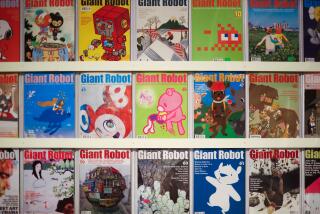Ogata’s Universal Humor Vaults Cultural Barriers
- Share via
Last Friday, Japanese satirist Issey Ogata played a one-night engagement at the Japan America Theatre, the first stop on his scheduled American tour. Because of teeming throngs at the will-call window, Ogata’s one-man show, “A Catalogue of City Life,” was delayed 35 minutes while management hustled to seat the capacity crowd.
Ogata has been hailed in Japan as a comic master, who has broken new ground in his country by doing the unprecedented and previously unthinkable: poking mild fun at the foibles and idiosyncrasies of Japanese society.
Ogata’s performances in America are simultaneously translated into English via headset. Comedy is ephemeral, requiring a daunting precision of timing and material. Of course, many in Ogata’s appreciative audiences speak Japanese, but for those who don’t, the headsets occasionally get in the way of the laughs, despite the best efforts of simultaneous translator M. Hart Larrabee IV, who valiantly keeps pace with Ogata throughout a two-hour plus show.
There’s always the chance that, given two such diverse societies as Japan and the United States, some of the humor may be lost in the translation. And indeed, Ogata’s material, which has been deemed wildly daring and subversive in his native land, seems somewhat unassuming here, especially in contrast to the barbarous candor of American political satire.
However, as Ogata reels through his challenging repertoire of characters, from a harried Japanese “salaryman” who has forgotten his own identity, to an incomprehensibly blustering politician, one suspects that some of the lost laughs are due more to a pacing gap than a culture gap. Even given the limitations of the headsets, Ogata’s timing seems occasionally sluggish.
Despite this, the show, directed by Ogata’s longtime collaborator Yuzo Morita, proves a worthy showcase for Ogata’s comic gifts. Antic and appealing, Ogata combines a childlike naivete with the grace and fluidity of a great mime. Relaxing within the kinder, gentler rhythms of the piece, one is struck by the universality of Ogata’s prevalent persona--the hapless everyman who transcends limitations of language and culture.
More to Read
The biggest entertainment stories
Get our big stories about Hollywood, film, television, music, arts, culture and more right in your inbox as soon as they publish.
You may occasionally receive promotional content from the Los Angeles Times.










